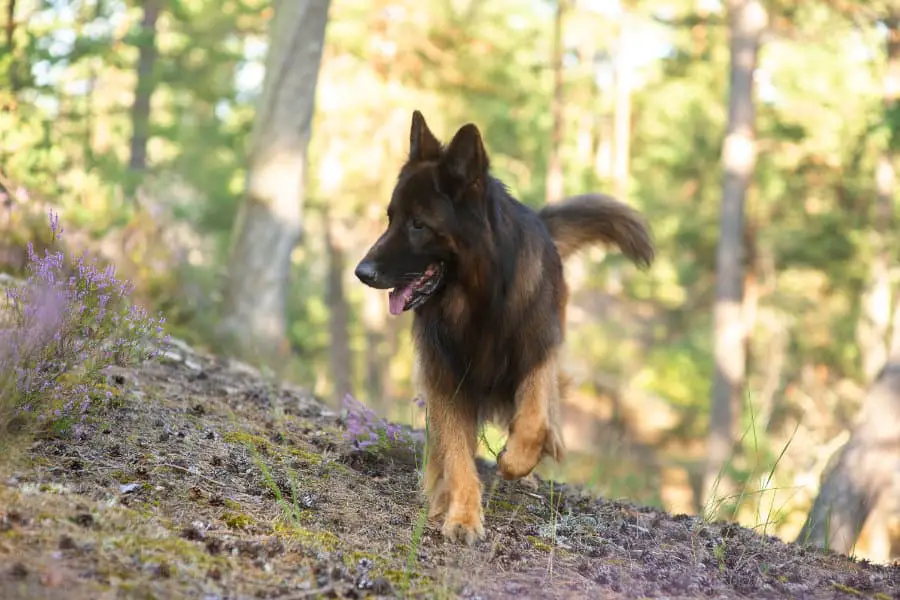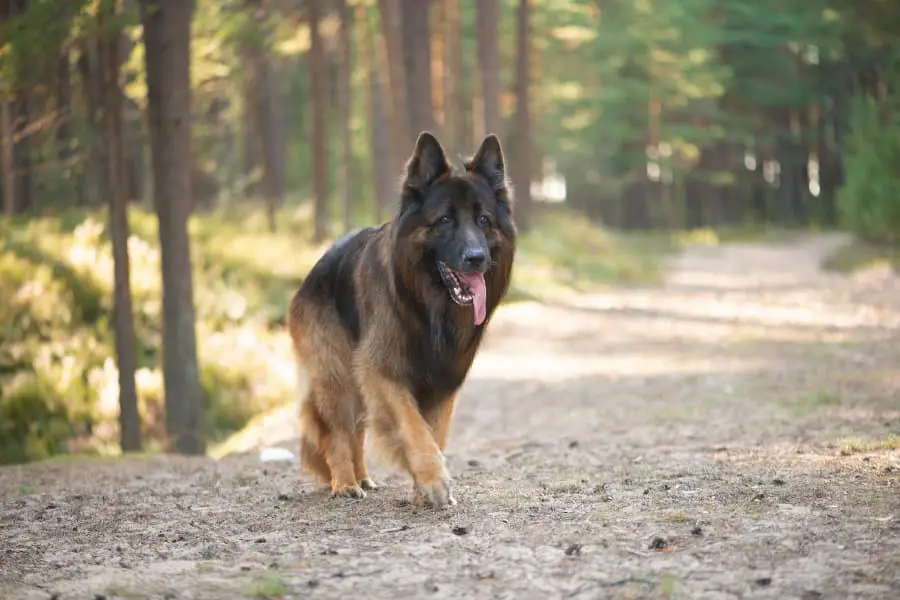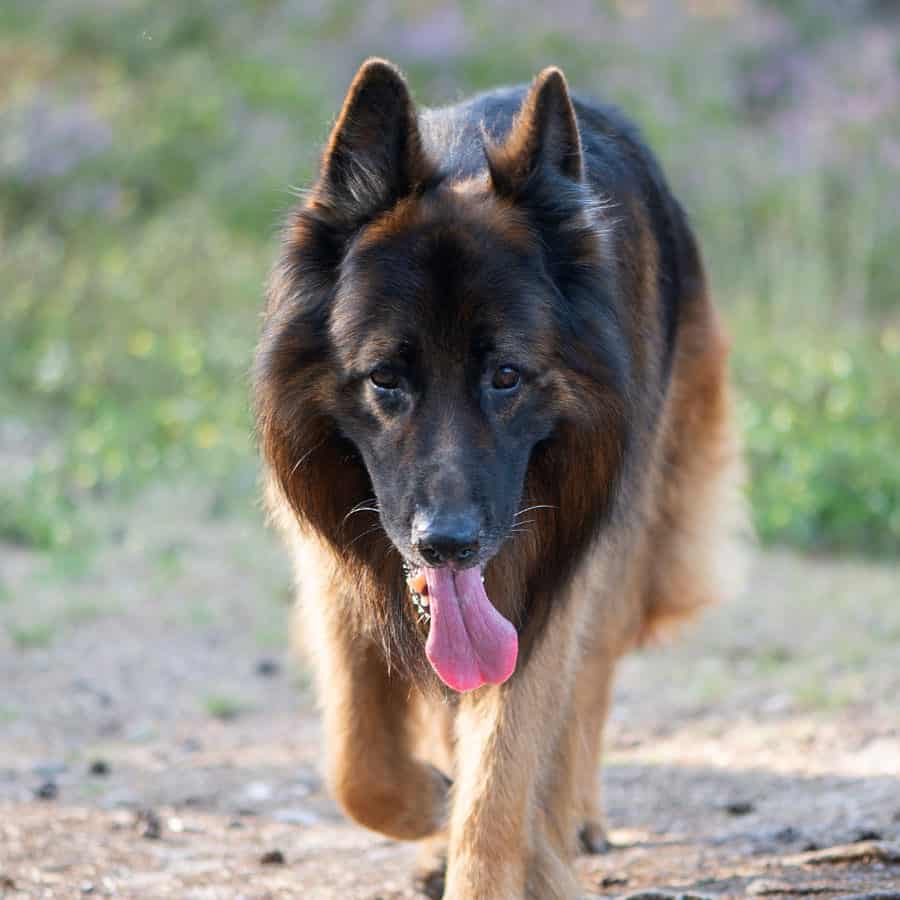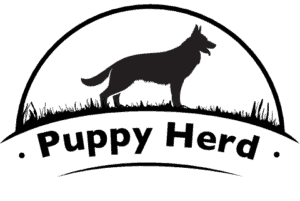German Shepherds are among the most popular breeds in the world. They make amazing pets and are very trainable. However, if you are allergic to pet dandruff, hair, or saliva, owning a German Shepherd could be a disaster. German Shepherds are known for all of these. However, German Shepherds are so popular and beautiful of a breed that many people want to know if there is a specific German Shepherd breed or mix that is hypoallergenic. One of these include the long-haired German Shepherds.
In general, German Shepherds are not hypoallergenic. Depending on the specific German Shepherd, they can even be among the worst dogs to own if you have any pet allergies. However, long-haired German Shepherds have some characteristics that make them more hypoallergenic (not fully) than their short-haired counterparts.
We will address what long-haired German Shepherds are like. We’ll also explain some of the characteristics of a long-haired German Shepherd that make it more hypoallergenic than short-haired German Shepherds. However, it is worth mentioning that every dog will produce allergens. You should not expose yourself to any dogs if you have no tolerance to pet allergens such as asthma.
The Difference Between Short-Haired, Medium, And Long-Haired German Shepherds
The differences between short-haired, medium-haired, and long-haired German Shepherds lie primarily in the length of their hair and fur. Short-haired German Shepherds have hair length of 1 inch. Long-haired German Shepherds have hair length of over 2 inches and are the rarest among the three.

Short-haired German Shepherds are among the most common types of German Shepherds and tend to be excellent work dogs as well as pets. Medium-haired German Shepherds make good pets and tend to have a specific beauty that makes them good show dogs.
Long-haired German Shepherds are not commonly work dogs and may not even be allowed in most shows because they are considered “genetic faults” instead of a breed (something that is changing). However, they are known to make better pets than their short-haired counterparts because of their better temperament.
Long-haired German Shepherds are among the most beautiful purebred dogs known. Unlike their short-haired counterparts these dogs have long tufts of hair around many parts of their body including:
- The neck
- Ears
- Paws
For this reason, long-haired German Shepherds have a special feathering look unique to this specific breed (or sub-breed). The look of a long-haired German Shepherd is hard to find in any other breed.
Shedding Can Be Controlled Easier On A Long-Haired GSD
The degree that a dog can trigger allergies can be dependent on the shedding of hair. There is a myth that there are some dogs that never shed. Even breeds such as terriers which are classified as hairless have hair to shed, albeit very short. If the dog has hair, it sheds it.
The volume and frequency of shedding depends on the breed and the dog itself. Dogs with short hair can’t lose too much of their coating otherwise they could freeze during the cold months. Although they won’t shed a lot, they will shed year-round, but in small volumes. They can still cause allergies, and since this happens year-round, allergies can be less controlled.
There are many long-haired dogs that have two coats, a dense inner coat called the under coat and an outer coat that consists of their long hair, sometimes called guard hairs. They tend to shed their under coat seasonally and their guard hairs not so often. They may even shed only during winter and summer. In fact, the shedding is frequently caught in their guard hairs and needs to be brushed so the hair doesn’t spread all over the place and cause too many allergies.

Some long-haired dogs have only their guard hairs. They don’t have much of an undercoat to shed seasonally. In fact, most long-haired German Shepherds have no undercoat, a characteristic unique to long-haired German Shepherds. Dogs that shed in large volumes have an undercoat.
Long-haired German Shepherds may shed, but not in large volumes. Their long hair could catch their shedding and require a brush or even wash to remove. Therefore, not as much hair will be left throughout the home.
Keep in mind, while most long-haired German Shepherds don’t have an undercoat, some do and they can shed massive volumes seasonally along with their guard hair.
While most long-haired German Shepherds have controlled shedding, this will not be a large deterrent from pet allergies, but it can help.
Pet Dandruff May Not Be As Bad On Long-Haired GSDs
Are you allergic to dust? There is a good chance dust will at least make your nose twitchy. Dust is at least partially made of dead skin cells from people or pet dandruff.
While pet hair can be a contributor to allergies, it is far from the largest contributor to pet allergies. In fact, many experts argue the main reason people are allergic to pet hair is not the hair itself, but the pet dandruff commonly found on that hair.
Dead skin cells whether from you or your pet are more likely to shed when dry. Dry skin cells are less likely to hold onto live skin and could come lose with a little force.
Long-haired German Shepherds usually have less dry skin than other dogs and therefore, less pet dandruff. The reason why is because of their guard hair. The guard hair protects your dog from cold weather and dirt which can dry the skin and cause pet dandruff. Dogs with shorter hair can be more exposed to dirt and the weather and their skin may dry more easily.
Long Hair Catches Dandruff
Dandruff may be easy to come loose from a pet’s skin, but it is also very easy for the dandruff to be trapped. Many fibrous or porous materials can capture dandruff. For instance, dust cloths can easily capture dandruff, and so can the long hairs from a dog’s coat.
The main reason experts claim people are allergic to pet hair is the dandruff stuck on the hair. The long hair from a long-haired German Shepherd’s guard coat can easily trap dandruff so you do not have to breathe it in and your allergies can be more controlled.
However, long-haired German Shepherds do shed, just not too much. Therefore, they can release some pet dandruff. Long hair only helps to capture some dandruff, just like it only captures some shedding.
Saliva And Urine Can Cause Allergies
Hair and even dandruff are not the only sources of dog allergies. Saliva is a very frequent source of dog allergies. The saliva of dogs contains proteins that peoples’ immune systems can disagree with, causing an allergic reaction.
Dogs that are very slobbery can cause massive allergies. Some of these dogs include Bulldogs and Saint Bernards. These breeds of dogs can cause significant allergies via saliva.
Even the urine from dogs could cause allergies. Some experts propose that pet urine contains similar proteins as their saliva that can cause allergies. Urine may have these proteins that flare up allergies, but the main reason urine appears to cause allergies is surprisingly simple.
Pet urine contains ammonia. Ammonia is an irritating compound, especially for the respiratory system. Exposure to ammonia via pet urine can irritate the respiratory system in similar ways to allergies making it almost like a universal allergen. The respiratory irritation from the ammonia can even amplify the effects from other allergies. Even if you have no allergies to pet urine or even pets, a pet’s urine could amplify the effects of anything you are allergic to.

A Dog’s Temperament Is Linked To Their Drooling And Urination
A dog’s behavior is linked to their temperament including:
- Drooling
- Saliva production
- Even urination behaviors
Unfortunately, German Shepherds have a mixed reputation where some believe they can be vicious because they are frequently used by cops and soldiers while others believe they are among the most calm and loyal dogs.
The “viciousness of German Shepherds” are largely myths. German Shepherds, and most dogs for that matter, are not innately vicious. In fact, the behavior of a dog is largely dependent on how the dog was trained. A dog that was not properly trained will have poor behavior.
German Shepherds are rather easily trainable, but short-haired German Shepherds are known for their desire to exercise and even work in some cases which could affect their temperament. While some believe long-haired German Shepherds are better behaved and have an even better temperament. However, there is no definitive proof that the length of a dog’s hair is linked to their temperament.
If you have issues with pet allergies that are largely linked to saliva and urination, but love having pets you should focus on having a pet that is trainable. German Shepherds are definitely trainable and long-haired German Shepherds would be a good choice.
However, training dogs requires extensive effort, especially if the dog is adopted. It may be expensive and/or take years to have a properly trained dog that can control their allergens. The dog breed will only be one small factor in this matter.
How To Live With A Dog And Allergies
A dog’s breed is an important factor in the pet allergies you will be exposed to. Some breeds will be factories for pet allergens. Generally, German Shepherds are among the worst breeds you should be exposed to if you have pet allergies. However, there are many sub-breeds or specific breeds that will be better for your allergies.
While finding the right breed will help, there are better ways to control your pet allergies than by simply choosing a hypoallergenic dog breed. After all, even the most hypoallergenic dogs produce allergens, and dogs with excessive saliva or bad urinating patterns will do worse than dogs who merely shed excessively.
Train Your German Shepherd
A well-trained dog will certainly help with your allergies. While many dogs (especially German Shepherds) are easier to train than others, each requires a specific method of training.
One of the best ways to control dog allergies is to control where your dog goes. You can train your dog to stay out of certain rooms and areas such as your bedroom. You should even train them to stay off furniture to prevent them from spreading allergens.
Training your dog to go outside is essential. If your dog urinates inside the house, it may be near impossible to remove the allergens or the ammonia which can amplify your allergies.
Groom And Bathe Your Dog
Grooming and bathing your dog can help remove allergens that could flare up your allergies. It helps control how much of their hair and their dandruff stays on them.
But be careful not to over do it. If you bathe them too often you could accidentally dry their skin excessively which could make them form more dandruff.
Keep Your Pet Healthy
Dry skin on a dog could be caused by:
- Cold weather
- Dirt
- Even the number of baths you give them
However, sometimes dry skin is an indicator for an underlying condition. Strangely enough, dry skin for a dog could be caused by allergies including:
- Pollen
- Dust
- Even your own dandruff
More crucial issues can cause dry skin including:
- Skin mites
- Fleas
- Undernutrition
- Thyroid issues
The best way to prevent these issues is to give your dog quality dog food that suffices their nutrition. Preventative treatments for fleas and ticks will also do wonders for your dog’s skin and hair health.
Clean Your Home
You may not like allergens from your dog. They can make your skin itchy, make you form a rash, or even hives. Frequent cleaning including vacuuming floors and cleaning furniture can help remove allergens from surfaces you frequently touch.
Allergens also irritates your airways as you breathe it in. It is just as crucial to clean the air as it is to clean surfaces. It may sound hard to clean the air, but there are many filters including HEPA filters that act like vacuums to remove allergens of all kinds from the air.
Test Yourself For Allergies
While you may wrinkle your nose around your dog, you should remember that correlation is not causation. Even if you have allergies around your dog, you may not be allergic to your dog at all.
It is not uncommon for people to think they are allergic to their dogs while truth is their dog was exposed to pollen that the person is allergic to. Dogs could even run into plants like poison ivy and carry the oils that cause the rash in their hair. Those oils can transfer over to you so you could develop a nasty rash from just touching your pet.
Also, how sure are you that your dog is the only animal residing in your house? Mice and rats produce more allergens than most dogs, and you may be surprised where those mice spread their allergens and how common it is to have these in someone’s home without them knowing. There are 21 million homes invaded by mice or rats each winter in the US, what are the chances you do not belong to that group?
Having yourself tested for allergens could rule out whether you are allergic to your pet. You are exposed to many elements each day and dozens or even hundreds of potential allergens.
Have Your Allergies Treated
Dog allergens tend to get to people rather commonly. If you have dog allergies it will be hard to live with your dog normally.
There are allergy shots and allergy therapies which can help you be more used to allergies or even develop an “immunity” to them. These are effective and even allow people to fulfill criteria to be trained in military service when an allergy could make you unfit. These types of treatments can help you to live with your pet without any issues.
Dogs may be man’s best friend, but pet allergies can torture people. Dog allergies do very little to stop anyone from having a dog if they really want one, and most people won’t know if they’re allergic until they start spending a considerable amount of time with a dog.
Hypoallergenic dog breeds and more allergy tolerant breeds can help people get the dog they want. After all, if one of the most allergy notorious dogs, the German Shepherd, has a specific breed, or according to some people “genetic fault” that helps to control allergens chances are every breed has a specific type that can help with their allergies. Sometimes having longer hair helps, but so does the lack of an undercoat, something surprisingly special to long-haired German Shepherd.
Furthermore, there are better ways to control your allergies. Frequent cleaning can help you conquer your allergies with your companion beside you.
